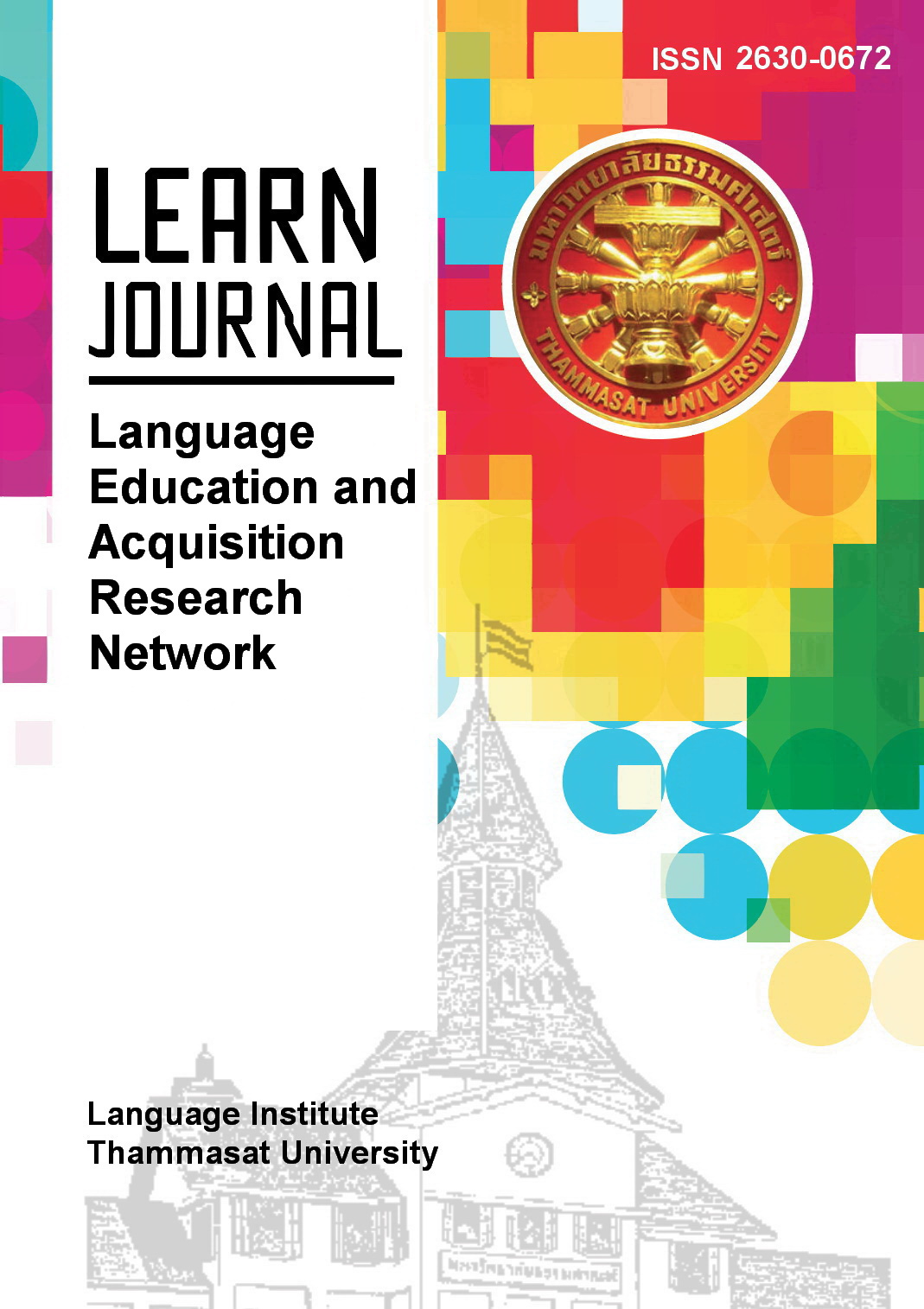Vocabulary Uptake and Retention from Reading a Graded Reader
Main Article Content
Abstract
With the aim of investigating effective approaches to extensive reading in Thailand, this study examined the vocabulary uptake and retention rate from reading 350 headwords graded reader. To determine the effects of reading a graded reader on students’ vocabulary knowledge and retention, 20 words within four bands of different frequencies of occurrences were selected as target words in the study. The spelling of each word was changed to ensure that students have never seen these words before. 35 intermediate level Thai students volunteered to participate in the study. Three tests, which were word-form recognition, meaning recognition, and translation, were administered immediately after reading, then after 10 days, and then after a two-month delay. The results demonstrate that words can be learned incidentally, as the majority of the words were not learned from reading one graded reader. Words with more frequency were more likely to be learned and more resistant to decay. The data indicate that, on average, the meaning of only three of the 20 words will be recalled two months later. This study implies that just a little amount of new vocabulary is remembered after reading one graded reader, and that substantial amounts of reading are required to increase students’ vocabulary.
Article Details
References
Aka, N. (2019). Reading performance of Japanese high school learners following a one-year extensive reading program. Reading in a Foreign Language, 31(1), 1-18.
Albay, M. (2017). The benefits of graded reading. International Journal of Social Sciences and Educational Studies, 3(4), 177-180. DOI:10.23918/ijsses.v3i4p177.
Barcroft, J. (2015). Lexical input processing and vocabulary learning. John Benjamins.
Brown, R., Waring, R., & Donkaewbua, S. (2008). Incidental vocabulary acquisition from reading, reading-while-listening, and listening to stories. Reading in a Foreign Language, 20(2), 136-163.
Coxhead, A. (2018). Vocabulary assessment. In J. I. Liontas (Ed.), The TESOL encyclopedia of English language teaching (pp. 1-6). John Wiley & Sons, Inc. DOI: 10.1002/9781118784235.eelt0628.
Day, R. R., & Bamford, J. (1998). Extensive reading in the second language classroom. Cambridge University Press.
Dickinson, P. (2017, April). Effects of extensive reading on EFL learner reading attitudes. The 21st Conference of the Pan Pacific Association of Applied Linguistics (pp. 28-35). Tamkang University, Taiwan.
Endris, A. (2018). The effects of extensive reading on EFL learners’ reading comprehension and attitudes. International Journal of Research in English Education, 3(4), 1-11. doi: 10.29252/ijree.3.4.1.
Gillis-Furutaka, A. (2015). Graded reader readability: Some overlooked aspects. Journal of Extensive Reading, 3(1), 1-19.
Hulstijn, J. H. (2001). Intentional and incidental second language vocabulary Learning: A reappraisal of elaboration, rehearsal and automaticity. In P. Robinson (Ed.), Cognition and second language instruction (pp. 258-286). Cambridge University Press. http://dx.doi.org/10.1017/CBO9781139524780.011
Jacobs, G., & Farrell, T. S. C. (2012). Teachers sourcebook for extensive reading. Information Age Publishing.
Laufer, B., & Aviad-Levitzky, T. (2017). What type of vocabulary knowledge predicts reading comprehension: Word meaning Recall or Word Meaning Recognition?. The Modern Language Journal, 101, 729-741. https://doi.org/10.1111/modl.12431
Maipoka, S., & Soontornwipast, K. (2021). Effects of intensive and extensive reading instruction on Thai primary students’ English reading ability. LEARN Journal: Language Education and Acquisition Research Network, 14(1), 146-175.
Milton, J. (2009). Measuring second language vocabulary acquisition. Multilingual Matters
Nation, I. S. P. & Waring, R. (2020). Teaching extensive reading in another language. Routledge.
Nation, I. S. P. (2007). The four strands. Innovation in Language Learning and Teaching, 1(1), 1-12.
Nation, I. S. P. (2013). Learning vocabulary in another language (2nd ed). Cambridge University Press.
Puripunyavanich, M. (2022). The implementation of a large-scale online extensive reading program in Thailand—From decision-making to application. LEARN Journal: Language Education and Acquisition Research Network, 15(1), 320-360. https://so04.tci-thaijo.org/index.php/LEARN/article/view/256726
Richards, J. C. & Schmidt, R. W. (2013). Longman dictionary of language teaching and applied linguistics (4th ed). Routledge.
Samitayothin, K. & Tapinta, P. (2018). Teachers’ attitudes towards the use of graded readers in promoting English reading skills in Thai EFL students: A case study of secondary school teachers in Bangkok. Humanities Journal, 25(1), 285-286.
Schmitt, N. (2010). Researching vocabulary. Palgrave Macmillan.
Stahl, S.A, & Nagy, W. (2006). Teaching word meanings. Lawrence Erlbaum Associates.
Suk, N. (2017). The effects of extensive reading on reading comprehension, reading rate, and vocabulary acquisition. Reading Research Quarterly, 52(1), 73-89.
Teng, F. (2020). Retention of new words learned incidentally from reading: Word exposure frequency, L1 marginal glosses, and their combination. Language Teaching Research, 24(6), 785-812. https://doi.org/10.1177/1362168819829026
Unchai, T., & Thongsan, N.C. (2021, March 26-27). Factors affecting extensive reading: The investigation of Thai primary students. The 2nd Language, Society, and Culture International Conference (LSCIC) (pp.188-208), Mahasarakham University, Thailand. http://human.msu.ac.th/lscic/
doc/Proceedings-of-LSCIC2021-as-of-11-June-2021-Online.pdf
Waring, R., & Takaki, M. (2003). At what rate do learners learn and retain new vocabulary from reading a graded reader?. Reading in a Foreign Language, 15(2), 130-163.
Waring, R. (2011). Extensive Reading in English Teaching. In Widodo, H. & Cirocki, A. (Eds.), Innovation and Creativity in ELT methodology (pp. 1-14). Nova Publishers.
Webb, S., & Nation, I. S. P. (2017). How vocabulary is learned. Oxford University Press.
Wesche, M. B., & Paribakht, T. S. (2010). Lexical inferencing in a first and second language. Multilingual Matters.
Zhang, L. J. (2002). Metamorphological awareness and EFL students' memory, retention, and retrieval of English adjectival lexicons. Perceptual and Motor Skills, 95(3), 934-944. doi:pms.2002.95.3.934


